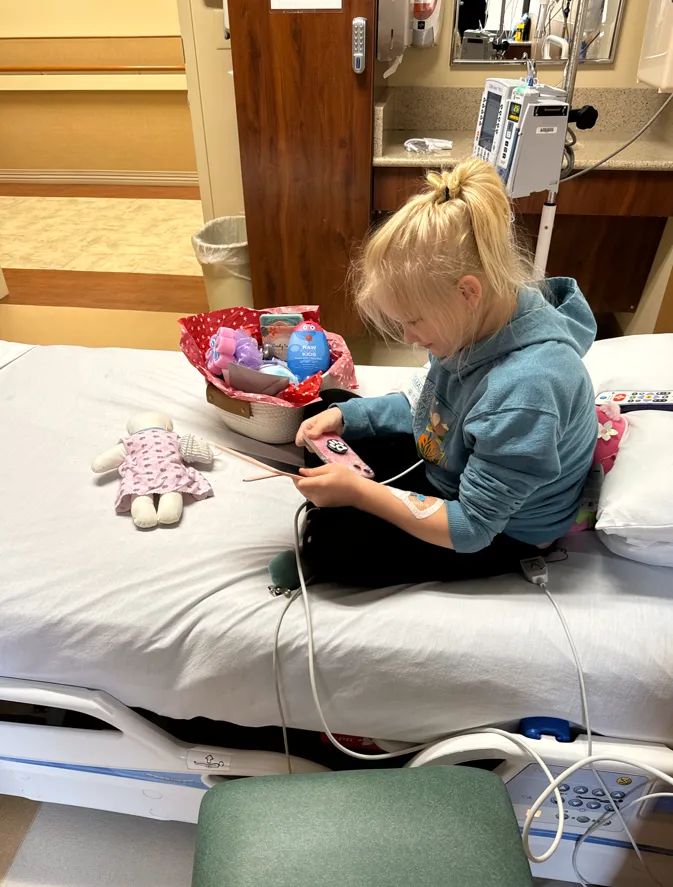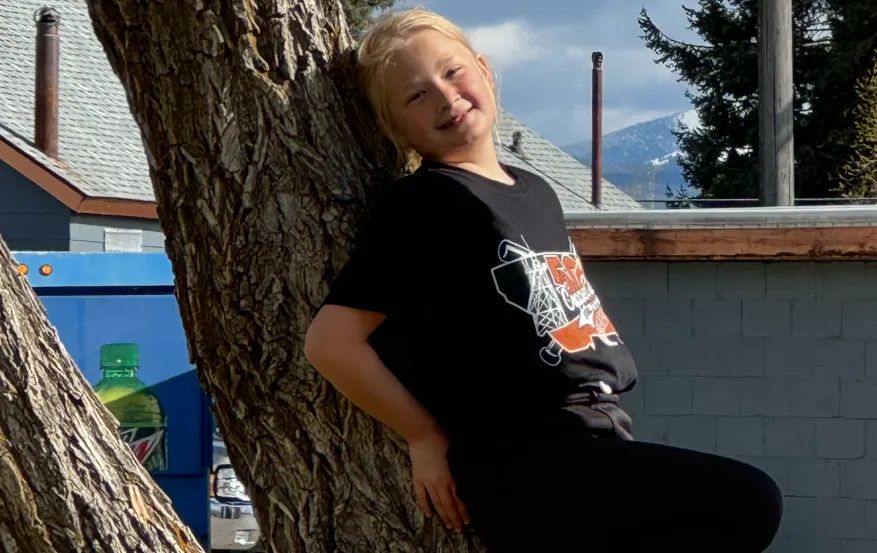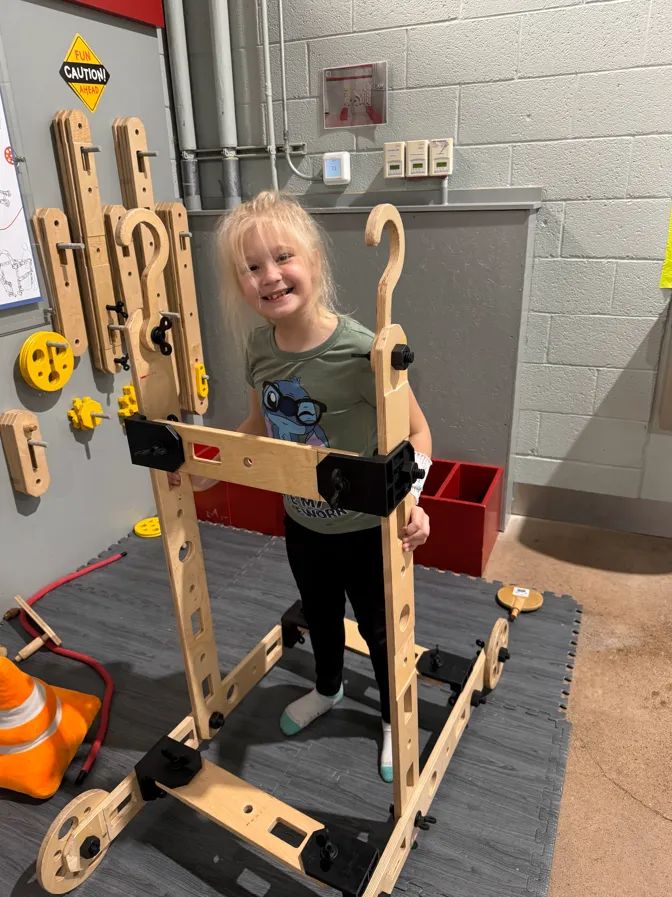
Innovative Treatment
Butte Girl Receives New therapy to delay the onset of type 1 diabetes
St. Vincent Regional Hospital
With a family history of type I diabetes, Sara Weldon knew that her children would be at a higher risk of developing the chronic condition that impacts the body's ability to create insulin and control blood sugar.
As a healthcare professional, she understood the impact a juvenile diabetes diagnosis can have on a child and wanted to be proactive. Weldon decided to have her daughters screened annually for Type I diabetes autoantibodies. Through the annual blood test, the screening allowed Weldon to understand her children's risk of developing Type I diabetes and to monitor the progression. With her oldest daughter, the test didn't indicate that she was currently at risk. After a first test of her younger daughter, Allison, at age 2, the screening indicated she had one of the autoantibodies, suggesting she was at risk.
Over the next four years, Allison continued to be screened. At age 6, the screening showed that Allison had all of the autoantibodies and was now at a higher risk of developing the condition.
"Allison's family history of Type I diabetes in conjunction with positive autoantibody levels put her at high risk of developing diabetes. Almost all individuals with two or more positive autoantibody levels will go on to develop Type I diabetes,” said Allison's pediatrician, Collette Chorney, MD. “We monitored her blood sugar levels to detect when she was developing signs of pre-clinical Type I diabetes. That's when we decided to send her to a pediatric diabetes specialist to explore options."
Dr. Chorney, referred her to Anita Azam, MD, a pediatric diabetes specialist at Intermountain Health St. Vincent Regional Hospital in Billings. They could connect mainly through telemedicine visits, allowing Allison to receive her care while home in Butte. After actively monitoring Allison for two years, an A1C test in February 2024, which measures blood sugar levels, indicated that her condition was progressing and that she would likely develop Type I diabetes.
"When we checked the A1C in November, it was 5.4, and then we checked in February, and it had jumped to 6.0, and she was diagnosed with pre-diabetes," Weldon said.
In discussions with Dr. Chorney and Dr. Azam, Weldon began exploring options for interventions to help her. Through discussions with her providers, Weldon learned about a new innovative treatment that can delay the onset of diabetes for children in Allison's age and state of the condition for two to five years. After discussing the treatment with her providers, they decided to move forward. Allison is believed to be the first child to receive the treatment in Montana and the first in the Intermountain Health system of hospitals.
"If we could give her even six months of being a regular kid without having to manage the disease, it would be worth it," Weldon said.
The medication is given as an intravenous infusion and was approved by the Food and Drug Administration in 2022 specifically to delay the onset of stage 3 type 1 diabetes – the stage when the body can’t make enough insulin on its own and requires insulin injections. It is for adults and children 8 years of age and older who have stage 2 type 1 diabetes.

“Meeting very specific criteria for qualifying for treatment is one of the biggest challenges. To qualify, patients have to be at least 8 years of age, their blood sugars and Hemoglobin A1cs need to be within pre-diabetic ranges, and they must have at least 2 antibodies present,” Dr. Azam said.
Allison traveled to St. Vincent Regional Hospital in Billings to receive the treatment, which involved 14 days of infusions of the medicine. The treatments do cause some initial side effects, but after two weeks, Allison bounced back, and her body responded well. Two weeks following the treatment, her blood sugar levels were back in the normal range, and Weldon noticed a significant improvement in Allison's symptoms.
"Within the first five days, I noticed it was working," Weldon said. "Before, she was always hungry and thirsty, and now she is doing amazing. She is feeling better and is much more energized."
“It has been a privilege and a joy to work with Alison and her family,” Dr. Azam said. “Allison was so brave throughout the whole process, and Sara has been exceptional, patient, and willing to do whatever was needed to have this treatment available for her child, including getting timely lab testing, blood sugar monitoring at home, and being aware of subtle symptoms, such as increased thirst, increased hunger and behavior changes.”
For other parents who may have children who may be at risk of developing Type I diabetes, Weldon recommends that they talk to their providers about screening, be proactive, and be advocates for their children. Weldon is also grateful that Allison received this innovative treatment here in Montana.
"As a parent, this has been hard. It was a waiting game," Weldon said. "It is nice not to have to worry for now."

Dr. Chorney, recommends that parents ask their child’s pediatrician about the risk factors for Type I diabetes, such as a family history of Type I diabetes or history of other autoimmune disorders. Based on these risk factors, they can work with their pediatrician to discuss if it would be appropriate to screen their children for Type I diabetes autoantibodies.
“It feels great to be able to offer this level of care here in Montana,” Dr. Azam said. Our amazing team, including our medical assistants, nurses, hospitalists, and pharmacists at St. Vincent's, is what has made this possible.”
“The ultimate hope would be for a cure or complete prevention of development of the onset of Type 1 diabetes for children like Allison,” she said. “The advancements in diabetes management have been astonishing, and these new treatments offer great hope.”









